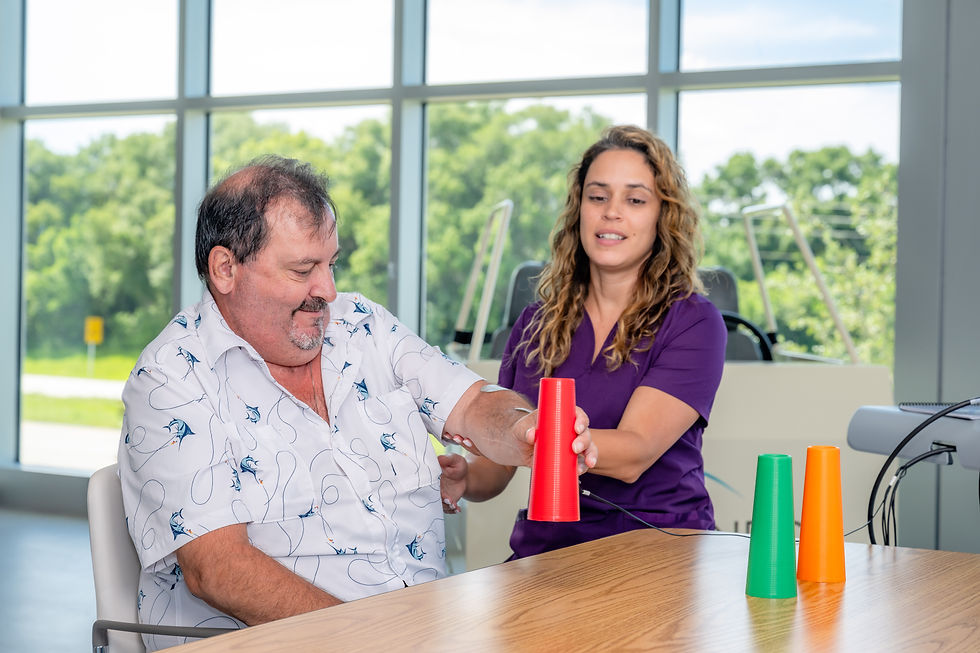Incorporating Mental Health Resources In An Inpatient Rehabilitation Hospital Setting
- Milwaukee Rehab
- May 31, 2022
- 4 min read
For patients, caregivers and providers
May is mental health awareness month and we recognize that additional mental stress can occur during the rehabilitation process from a debilitating illness or injury. At Milwaukee Rehabilitation Hospital at Greenfield, we ensure we have the resources to approach mental health needs or challenges that are associated with a medically debilitating illness or injury.
The American Hospital Association (AHA) supports the integration of behavioral and physical health and helps hospitals play a key role in establishing partnerships to ensure access to a full continuum of behavioral health care. We are sharing some effective ways in which to keep mental health at the forefront in the inpatient rehabilitation hospital setting for our patients, their caregivers and each other.

Support of family and friends
One of the essential factors in a patient’s recovery after a debilitating disease or injury is the involvement and support of family and friends. The family plays a vital part in the rehabilitation process, including emotional and physical support. Positive attitudes and encouragement from the family can inspire the patients’ commitment and progress in their rehabilitation. Additionally, the involvement from the family can ease the transition back to their home environment, especially if the family also serves as a caregiver.
Over 65 million people in the U.S. provide care for a loved one that is disabled, chronically ill, or aged. When family members are required to be accountable for the care of a loved one, the stress can be overwhelming. Additional pressures around living arrangements, care follow-up, and financial pressures also add to the burden for the family. At Milwaukee Rehabilitation Hospital, we are here for the family and embrace the family’s involvement in the rehabilitation and education process. We realize family members can be great patient advocates and know their loved ones best. We consider the family part of the care team and encourage active communication between the family and our care team. Our care team will support the family by including them in the rehabilitation plan of care, the rehabilitation treatments, and the progress achieved as well as educating the family on what to expect going forward beyond the hospital stay.
Emotional support
Our hospital team aims to serve as a resource to the family and patient both physically and emotionally. We have access to mental health specialists and psycho-social clinicians to assist with emotional and psychological support. Here are 3 tips to aid in decreasing the mental exhaustion or the desire to give up after a debilitating injury or illness:
Set clear and realistic goals. By setting goals, the patient’s progress is measurable day in and day out. We celebrate the smallest of achievements! Each goal achieved can inspire the patient to push through the treatments for the most significant accomplishments.
Visualize a healthy you. Don’t underestimate the power of visualization. Studies have shown that when we visualize the action and actually perform that action, we stimulate our brains to do more.
Being positive and keeping positive influences in your life can lead to improved outcomes during rehabilitation.
Home transition support for both patient and caregiver
Our care team and case management team provide the family with many community based resources that may be needed upon release from our hospital. These resources may include follow-up and in-home care, home environment adjustments, tools and equipment for mobility, speech, and strength. Additionally, drastic changes in lifestyles resulting from a disabling injury or disease can affect the emotional aspect of a patient and the family. These mental stressors can delay the rehabilitation process and the well-being of the entire family. We want patients and family members to understand they are not going through this journey alone even after leaving our inpatient rehabilitation hospital.
Support groups are one option to connect with others that may be going through a similar injury or diagnosis, and they typically focus on a specific situation or condition. Our team can provide the appropriate ones to the patient and the family. There are many support groups throughout the United States for Stroke, Brain Injury, Amputees, Spinal Cord Injury, and many others.
Some benefits of these groups and professional associations:
Social interaction in a safe environment
Sense of empowerment
Improved coping skills
Opportunity to gain information about ongoing rehabilitation needs and treatment
Support for healthcare professionals
Healthcare providers and staff are facing challenges like never before due to the COVID-19 pandemic and its lasting effects. Research shows that nurses are substantially more likely than others to take their own life, and recent news only drives this point home. There are many ways to address mental wellbeing, including mindfulness and stress reduction; crisis support; and, if needed, therapy and/or medication.
Just as the airlines state, we all need to put our own oxygen masks on before helping others in emergencies. Tending to individual mental wellbeing is crucial for all, especially physicians and frontline healthcare workers. We cannot be our best for our inpatient rehabilitation hospital patients if we are not filling our cups first and ensuring we’re taking care of our minds, bodies and souls. Our leadership encourages this as well, and takes time to ensure chronic stress and mental wellbeing is kept at the forefront.
Some additional resources that may be helpful for the patients, caregivers and our care team:
https://www.aonl.org/resources/leading-through-crisis
National Suicide Prevention Hotline at 1-800-273-8255. If you prefer to text, use the Crisis Text Line—text HOME to 741741 to be connected to a live, trained crisis counselor.
https://ncoa.org/article/5th-annual-older-adult-mental-health-awareness-day-symposium
https://www.aha.org
We encourage families to contact us with any questions about the inpatient rehabilitation process. You may reach us at 414-441-0500 .
Milwaukee Rehabilitation Hospital | www.milwaukee-rehabhospital.com/











